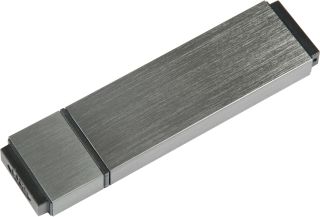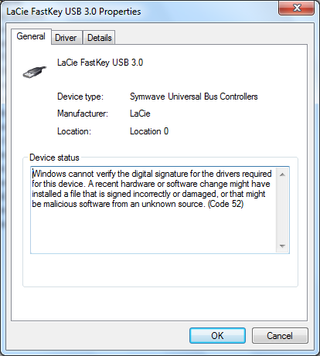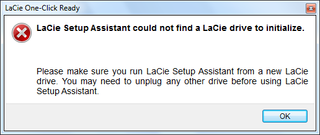Nine USB 3.0 Flash Drives For Road Warriors
The best ultra-portable USB 3.0 storage products from 16 to 128 GB square off in a grand comparison. We found wildly disparate transfer rates ranging from 200 MB/s down to a snail’s pace. At the end, though, two products rose to the top of our list.
LaCie FastKey USB 3.0 (120 GB)

With read speeds of up to 191 MB/s and anything between 189 and 141 MB/s for writes, the FastKey from LaCie is another fast flash product with USB 3.0. The FastKey is available with 30, 60, or 120 GB of storage capacity. The drive is simple-looking in greyish metal. That’s typical LaCie style, with a technical touch.
However, this extra touch of class comes at a price: the 120 GB model we tested costs a prohibitive $475. The 60 GB model is $250, although these prices are taken from LaCie’s Web site, as the products aren’t as widely available elsewhere. Compared to its competitors, the FastKey’s two-year warranty is almost embarrassingly short. Other devices we tested come with warranties of three or even five years.
An added benefit is three years of 4 GB online storage on Wuala. The distributed data is always encrypted and is managed through a drag-and-drop interface. LaCie speculates that users will soon want more than 4 GB of storage, which will of course be available for an extra fee. There is also an encryption solution called LA-PRIVATE, which creates and manages an AES-protected disk for your data.
Unfortunately, the bells and whistles do not add up to much if the product fails on basics. Because we cleared the stick’s memory (including the partitions) for some benchmarks, we were unable to retroactively start the software’s pre-installation. We were likewise unable to install the provided high-speed driver from Symwave on our 64-bit version of Windows 7, which should allow for over 300 MB/s of throughput performance.
We do want to emphasize, however, that despite a few glitches, LaCie has a great eye for detail. None of the FastKey’s competitors offer a similarly-complete white paper with such a technically-sound background. The white paper notes, for example, that a 32-bit version of Windows is required for maximum performance. And despite our testing problems, the FastKey still performs extraordinarily well in our benchmarks. Yet, the problems prevent us from recommending the product, at least for the moment.




Stay on the Cutting Edge
Join the experts who read Tom's Hardware for the inside track on enthusiast PC tech news — and have for over 25 years. We'll send breaking news and in-depth reviews of CPUs, GPUs, AI, maker hardware and more straight to your inbox.
Current page: LaCie FastKey USB 3.0 (120 GB)
Prev Page Kingston HyperX Max 3.0 (128 GB) Next Page OCZ Enyo (128 GB)-
spectrewind Conclusion: This article ignores encryption.Reply
The article is a complete failure. You THG people ignored encryption as a metric. Why??!!
Flash drives are cheap. Company information and regulatory items (HIPAA for example) are priceless.
I'm a "road warrior" that depends on a flash drive for my daily work: IRONKEY. My employer provides it. I am legally required to use it. It is hardware encrypted. The drive might be stolen or lost, but the data will not seen by any unauthorized user.
If I lose my drive, the physical media is lost. I have medical databases that I am required to keep secret via government regulation. My drive will wipe itself after 10 incorrect login attempts.
Do any of the reviewed drives on THG do this? -
sudeshc Extremely good read, what i liked was that the companies are not making false claims anymore most of them performed as was claimed.Reply -
sudeshc spectrewindConclusion: This article ignores encryption.The article is a complete failure. You THG people ignored encryption as a metric. Why??!!Flash drives are cheap.Reply
This in my opinion is altogether a different topic and should be covered in different article where the encryption also as well as over performance be compared.
-
cangelini sudeshcThis in my opinion is altogether a different topic and should be covered in different article where the encryption also as well as over performance be compared.Reply
Agreed, I'll pass that feedback along to the author. -
Sphex If you actually read the article, you would know that the SuperTalent SuperCrypt encrypts its data with a password, like the IRONKEY. Maybe you should read.Reply -
spectrewind SphexIf you actually read the article, you would know that the SuperTalent SuperCrypt encrypts its data with a password, like the IRONKEY. Maybe you should read.Reply
I did read the article. One drive supporting cryto does not a metric make, which I mentioned. That feature is an anomaly and not a fundamental feature (metric) of the article.
"Maybe you should read."
Reading is good. Comprehension is even better. I suggest you begin there, since you obviously cannot do that. -
injected_metal Reply9513351 said:IRONKEY. My employer provides it. I am legally required to use it. It is hardware encrypted. The drive might be stolen or lost, but the data will not seen by any unauthorized user.
Your post reads like an advertisement and you complain that they didn't do an encryption comparison when only 1 drive supports it at hardware level. On top of that cant you read, this is a USB 3.0 test, ironkey only does 2.0. Furthermore your employer provides your drive so what difference would it make if they said your ironkey was a slow but safe piece of $#!t? This is an everyday-user drive roundup for fast file transfer, not a business specific roundup that would be useless to most tom's readers. You said it yourself, your company provides secure storage since they expect you to move important files. Typical users won't need this and if they do the decision most likely will be out of their hands. Additionally in a security environment the protection far outweighs the need for speed, so the test metric would be completely different than how consumer grade drives would be tested.
tl;dr
You don't seem to comprehend the use of your drive and what features the owner actually values. -
willgart some test with encryption enabled are missing. what is the impact of an encrypted drive? what are the encryption option?Reply
we do not always looking for speed, we are also looking for backup or archive of sensitive data.
and other peoples are looking for speed only, for sure, because they hate loosing time in data transfert :)
but the same questions are also for classic HDD, not only USB keys. -
Bolbi I purchased a 16GB A-DATA S102. It's not a premium product, but it does receive a significant performance boost from USB 3.0 (according to other reviewers; my USB 3.0 laptop is still in Fedex's hands). The drives in this review, I think, are for those who need only the best features and performance. The average user can still get better performance out of a "regular" USB 3.0 flash drive.Reply
Most Popular


